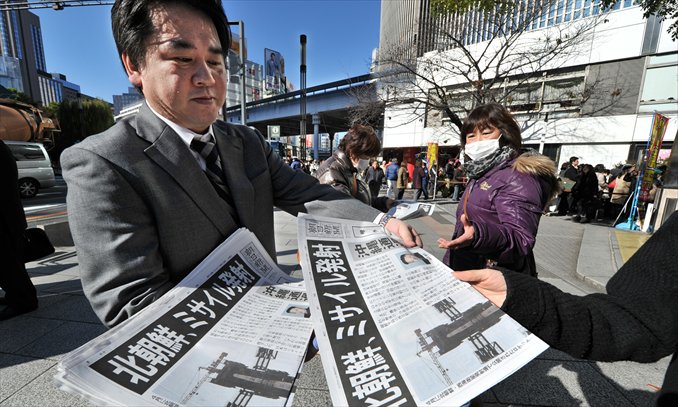China ‘regrets’ N.Korean launch

Read more in Special Coverage:
North Korea on Wednesday successfully put a second version of the satellite Kwangmyongsong-3 into orbit using the Unha-3 carrier rocket, defying calls from the international community to drop the launch plan, which was widely believed to be a covert test of long-range missile technology.
The rocket blasted off from the Sohae Space Center in Cholsan county, North Phyongan Province at 09:49, and sent a "scientific and technological satellite fitted with survey and communications devices essential for the observation of the earth" into a preset orbit after nine minutes and 27 seconds, the official Korean Central News Agency reported.
The abrupt launch came hours after reports said North Korea had started to dismantle the rocket on the launch pad to fix a "technical deficiency" in the first-stage control engine. Pyongyang said on Monday that the launch window had been extended by a week due to technical problems, but in a quick about-face launched the rocket well before that time.
"North Korea has fooled the entire world with these deceptive moves," said Lü Chao, a Korean Peninsula issues researcher at the Liaoning Academy of Social Sciences.
"The North's leaders know well that all their activities at the launch site were under US satellite surveillance and when these satellites pass above North Korea," he said.
"Considering the real threats from the US and Japan to intercept the rocket, North Korea had to make this choice, even though in a sense it wasn't very honest," Lü added.
The launch quickly provoked international condemnation. The US, South Korea and Japan quickly labeled it a test of technology that could one day deliver a nuclear warhead capable of hitting targets as far away as coastal cities in the western US.
UN Secretary-General Ban Ki-moon on Wednesday strongly condemned North Korea's rocket launch and said it "is a clear violation of Security Council resolution 1874, in which the Council demanded that the DPRK (North Korea) not conduct any launch using ballistic missile technology," Ban's spokesman Martin Nesirky said in a statement.
China "regrets" the North's satellite launch amid the "universal concerns" of the international community, China's foreign ministry spokesman Hong Lei said on Wednesday.
But he noted that North Korea "is entitled to the peaceful use of outer space," which is currently constrained by UN Security Council resolutions. As a UN member state, North Korea is obliged to observe these resolutions, Hong said.
In response to a question on "what action the UN Security Council should take," Hong said the Chinese side believes that the Security Council's response should be "prudent and moderate" and conducive to maintaining the overall peace and stability of the peninsula instead of escalating tensions.
Washington condemned the launch as a "highly provocative act" in direct violation of UN resolutions and vowed to work with international partners to seek "appropriate action" against Pyongyang, while Japan's UN envoy called for a Security Council meeting, according to Reuters.
The Russian foreign ministry said that the North Korean launch "flaunts the opinion of the international community, including calls from the Russian side, and leaves us with deep regret." It also called on other nations to refrain from further escalating tensions.
South Korea also has an ambition to put a satellite in orbit, but it had to put off its third launch bid, which was first announced in late October, several times due to technical problems.
"The North's launch is likely to trigger a new wave of arms races in Northeast Asia and create new tension in this region. This is what the US would like to see because the US will have a say when Japan and South Korea pursue long-range missile technologies," said Xu Baokang, a former correspondent for the People's Daily in Pyongyang.
Lü said he believes that Japan, in particular, would like to take advantage of this opportunity to demand an amendment to the country's Peace Constitution, which would allow the rearming of the Japanese military and bring more instability to the Northeast Asia region.
"At a time when North Korea is suffering from domestic economic woes, it's inappropriate for the country's young leader to 'parade his wealth' in this way," Lü said.
South Korea estimates Pyongyang spent $1.3 billion on its rocket program this year, including the failed attempt in April. With this money, North Korea could acquire 4.6 million tons of corn, CNN reported, citing an official from South Korea's Ministry of Unification.
However, a North Korean foreign ministry spokesman said later on Wednesday, "no matter what others say, we will continue to exercise our legitimate right to launch satellites."

Agencies contributed to this story
